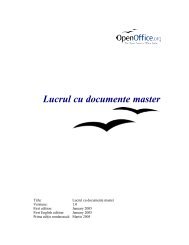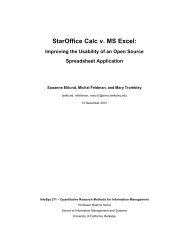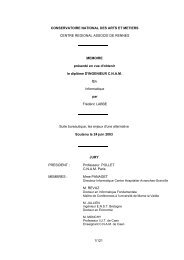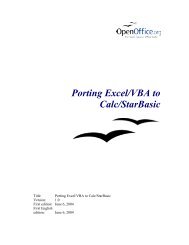The Microsoft Excel File Format - OpenOffice.org
The Microsoft Excel File Format - OpenOffice.org
The Microsoft Excel File Format - OpenOffice.org
You also want an ePaper? Increase the reach of your titles
YUMPU automatically turns print PDFs into web optimized ePapers that Google loves.
4.10 Internal and External References<br />
• Internal Names<br />
All internal names are stored in a list of DEFINEDNAME records (➜5.33) that follows the EXTERNSHEET record.<br />
<strong>The</strong>re exist two types of internal names: global names which are valid in the whole workbook and local names which are<br />
attached to a specific sheet. For instance the local name “MyCell” of the sheet “Sheet1” can be used from everywhere in<br />
the workbook by entering =Sheet1!MyCell. Each DEFINEDNAME record contains the name itself and a onebased<br />
sheet index. <strong>The</strong> index zero indicates a global name. If the document contains local names, a special REF entry<br />
will be created in the EXTERNSHEET record. It contains the index to the internal EXTERNALBOOK and the sheet<br />
range –2…–2.<br />
Inside of a formula a global name or a local name of the own sheet is represented by the token tName (➜3.9.1) with a<br />
one-based index to the DEFINEDNAME record list. Local names from other sheets (with explicitly denoted sheet name)<br />
are represented by the token tNameX (➜3.9.14) with an index to the special REF entry of the EXTERNSHEET record<br />
and an index to the DEFINEDNAME record list.<br />
In defined names, only 3D references are allowed. <strong>The</strong> special syntax =! allowed in defined names only<br />
( being a 2D cell reference or range reference) makes it possible to refer to cells or ranges in the same<br />
sheet that contains the formula cell with the defined name.<br />
Example for internal names: A document contains the global name “GlobalName”, and the local names “Sheet1!<br />
LocalName” and “Sheet2!LocalName”. In “Sheet1” there are the formulas<br />
=GlobalName,<br />
=LocalName,<br />
=Sheet1!LocalName, and<br />
=Sheet2!LocalName.<br />
<strong>The</strong> defined name “GlobalName” contains the formula<br />
=!$A$1.<br />
EXTERNALBOOK 0 Number of sheets: 3<br />
01 H 04 H (own workbook)<br />
EXTERNALBOOK 1 Number of sheets: 0<br />
Document = “” (Current sheet for defined names, ➜2.5.9)<br />
EXTERNSHEET<br />
DEFINEDNAME 1<br />
DEFINEDNAME 2<br />
DEFINEDNAME 3<br />
REF 0 = {EXTERNALBOOK = 0, sheet range = 0…0}<br />
REF 1 = { EXTERNALBOOK = 0, sheet range = –2…–2}<br />
REF 2 = { EXTERNALBOOK = 1, sheet range = –2…–2}<br />
Name = “GlobalName”, sheet (one-based) = 0 (Global)<br />
Formula = tRef3d token to REF 2 (➜3.9.15)<br />
Name = “LocalName”, sheet (one-based) = 1 (Sheet1)<br />
Name = “LocalName”, sheet (one-based) = 2 (Sheet2)<br />
<strong>The</strong> first formula in the example above contains the token tNameV referring to DEFINEDNAME 1 and the<br />
second formula the same token referring to DEFINEDNAME 2.<br />
<strong>The</strong> two latter formulas contain the token tNameXV with a reference to REF 1 in the EXTERNSHEET record.<br />
REF 1 refers to EXTERNALBOOK 0 with the special sheet indexes for defined names. <strong>The</strong> token of the third<br />
formula refers to DEFINEDNAME 2 and the token of the last formula refers to DEFINEDNAME 3.<br />
107















